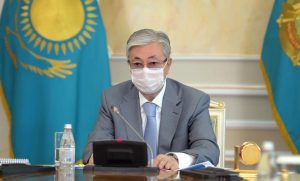On Monday, July 13, Kazakh President Kassym-Jomart Tokayev tweeted that the country’s second lockdown — which began on July 5 — would be extended through the end of July. Meanwhile, as case numbers soar a handful of media organizations in the country have banded together to catalogue the names of the dead missed by the government and Tokayev has threatened to fire his entire cabinet for failing control of the COVID-19 pandemic.
In his tweets on Monday, which Tokayev had earlier declared a national day of mourning, the Kazakh president indicated that there were signs of improvement but stabilization of the COVID-19 situation required an extension of the lockdown. When it was announced on July 5, the Kazakh government said the second lockdown would last at least two weeks, to July 19, with the possibility of being extended. It has now been extended through the end of July.
As of July 13, Kazakhstan had reported 59,899 cases of COVID-19 since the virus was first recognized in the country in mid March. According to official numbers, 375 have died.
But there is widespread concern in the region and among observers that Kazakhstan’s official data remains incomplete.
Like Russia, in early June, Kazakhstan began to separate its COVID-19 data, leaving out of topline figures confirmed cases that were asymptomatic — meaning the patient tested positive for the virus but did not exhibit noticeable symptoms or require hospitalization. Scientists believe that the novel coronavirus causing COVID-19 spreads before a given patient may feel symptoms. Even if one person contracts the virus and never develops symptoms, they could still spread it to others who may suffer greatly from the virus.
On July 1, Kazakh authorities began again including asymptomatic cases — leading to a dramatic spike in the data. On June 30, Kazakhstan had reported 22,308 cases of the novel coronavirus; on July 1 that number nearly doubled to 41,065 cases. On July 5, when the second lockdown began, Kazakhstan had reported 48,574 cases.
The question of including both symptomatic and asymptomatic cases is moot if there aren’t enough tests to go around. Kazakh authorities have reported an increase in pneumonia cases, with negative coronavirus tests, which triggered a brief wave of real “fake news” coming out of China that alleged a new deadly disease was emerging from Kazakhstan.
As the BBC reported, “Medical practitioners and family members of victims in Kazakhstan told the BBC’s Abdujalil Abdurasulov they believed the increased numbers of pneumonia cases were connected to the coronavirus but were going undetected because of low-quality testing or no testing at all.”
In response, a group of seven independent media organizations in Kazakhstan — including Vlast, Fackcheck.kz, and RFE/RL’s Kazakh Service (Radio Azattyk) — have begun to compile a public list of the dead on a new website. The new website, Umytpa.kz — umytpa is Kazakh for “do not forget” — lists the names of Kazakh citizens who have died either from the coronavirus or pneumonia. In a statement explaining the initiative, the media organizations highlighted that while health authorities claim a number of pneumonia deaths with negative COVID-19 tests, patients themselves have reported not being given tests and the state is no longer testing the dead.
The statement also notes that the pandemic has been “depersonalized” in Kazakhstan, with the disease appearing distant. Relatives of those who have died either from COVID-19 or pneumonia can submit names to be listed; the media organizations say names will only be printed after confirming the provided information.
“We are convinced that the dead should not be forgotten,” the statement says.
In its endless quest to avoid causing “panic,” Kazakhstan’s muddling with the very data that illustrates the enormity of the danger presented by the pandemic seems to have worsened the situation — at the very least, its handling of the pandemic hasn’t improved conditions. Journalists in Kazakhstan, like Joanna Lillis, have mentioned repeatedly on Twitter their anecdotal observations that Kazakhs are not widely taking preventing steps, like masking and social distancing.
In his tweets on Monday, Tokayev urged Kazakhs to take precautions like wearing face masks and social distancing. He also promised payments of 42,500 tenge (about $100) for those in need would continue through the end of July as well. (It’s worth revisiting this May piece by Anastassiya Fershtey on how poorly the process of getting those funds was going this spring).
While it would take a thorough survey to discover precisely why Kazakhs may not be taking precautionary measures and further research to figure out why and how the situation spun out of control, I’d argue weak general trust in government and poor, inconsistent, public health messaging are potential reasons.
It’s perhaps not surprising that Tokayev threatened to fire his cabinet last week. “I hope that the situation will improve within two weeks. Otherwise it raises the question: can the government as a whole work in in its current composition?” he said in a July 10 government session. He said a special commission would be created to look into “mistakes made by officials.”
































